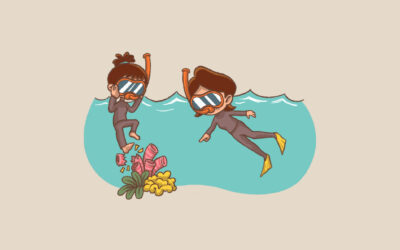Feeding Fish disrupts the balance of the ecosystem; endangering the lives of coral and, ultimately, fish.
Why Not to Feed Fish in Thailand’s Waters
The allure of Thailand’s turquoise waters is undeniable. Whether you’re swimming, snorkeling, scuba diving, or on a boat tour, the underwater world beckons with its vibrant coral reefs and colorful fish. While it might be tempting to feed the fish during these aquatic adventures, it’s a practice that can have serious consequences for the delicate marine ecosystem.
Picture this: you’re floating above a mesmerizing coral reef, and a school of fish surrounds you. It’s a magical scene that makes you want to share the experience by tossing some food their way. But here’s why you shouldn’t:
Disrupted Natural Behavior: When fish are fed by humans, they become dependent on this unnatural food source. They lose their ability to forage for their own food, which disrupts their natural behavior and affects their survival instincts.
Altered Ecosystem Balance: Feeding fish can lead to an imbalance in the marine ecosystem. Some fish might become dominant due to overfeeding, while others miss out on crucial nutrients. This can lead to a decline in certain species and an increase in others, upsetting the harmony of the underwater environment.
Harm to Coral Reefs: The interconnectedness of marine life is especially evident in coral reefs. Excess nutrients from feeding can cause an overgrowth of algae, which smothers the corals and damages their fragile structure. Coral reefs are already under immense pressure from climate change and pollution; adding more stressors could have catastrophic consequences.
Health Risks for Fish: The food that humans offer might not be suitable for fish, leading to malnutrition and even illness. Fish might also become aggressive in their quest for food, posing a danger to both other marine life and humans.
Legal and Ethical Concerns: Many marine protected areas in Thailand prohibit feeding fish to protect their biodiversity. Feeding fish in these areas can result in fines and legal consequences. Additionally, respecting the natural environment and not interfering with wildlife is a responsible and ethical way to enjoy nature.
The Reef’s Voice: Thailand’s coral reefs are among the most diverse and valuable ecosystems in the world. They provide habitats for countless species, protect coastlines from erosion, and support tourism. But they’re also fragile and vulnerable. A healthy coral reef sustains life, but an unhealthy one can lead to the loss of biodiversity and the livelihoods of coastal communities.
So, the next time you’re exploring Thailand’s enchanting waters, remember that the best way to enjoy the marine life is by observing it from a distance. Resist the urge to feed the fish, and let them thrive in their natural environment. By being responsible travelers and stewards of the ocean, we can ensure that the underwater wonders of Thailand continue to captivate and inspire generations to come.




